Embracing the Light with American McGee
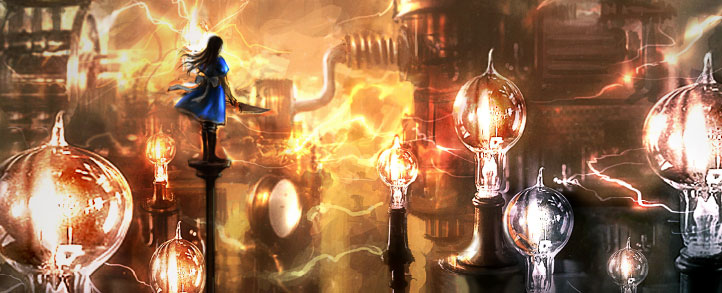
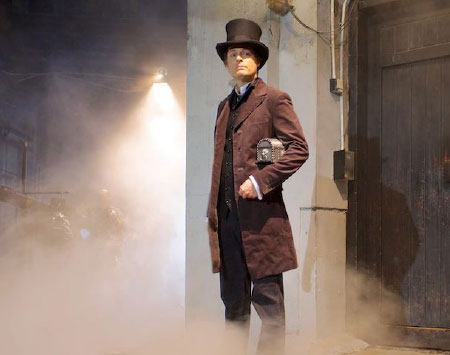 It's a rare occasion when we receive the opportunity to interview a man who has been a role model and a huge inspiration in our lives. Today, we are fortunate to sit down with the Tim Burton of gaming, American McGee, who has entertained us with his darker versions of our favorite fairy tales.
It's a rare occasion when we receive the opportunity to interview a man who has been a role model and a huge inspiration in our lives. Today, we are fortunate to sit down with the Tim Burton of gaming, American McGee, who has entertained us with his darker versions of our favorite fairy tales.
Gamers may recognize his work Alice, but many may not know that he was also worked on the hit classics Wolfenstein 3D, DOOM, Hexen and Quake. He has gone from a simple game tester to a successful entrepreneur over the course of his career.
While American's recent past shines bright with success and accolades, it did not come without its fair share of adversity. I had the chance to talk to American about his colorful past and how he overcame difficulties by finding fuel for creativity and success in the people around him.

Benjamin Foley: Thank you for taking the time to speak with us. For years, you have been taking some of our favorite fairy tales and bringing them to life with your creative spin. Have fairy tales always been something you wanted essentially to rewrite and create your own version of how they played out?
American McGee: I began to take an interest in adapting fairy tales to games after spending the early part of my career working on games with a sci-fi action theme (DOOM and Quake series). While working on those games, I had a sense that the technology we were building could do much more in terms of presenting story and atmosphere. Later, when I first saw what the Valve guys did with ID's tech, I knew I wanted to be involved with building much deeper, more story-driven games. Fairy tales interested me because they provide a natural foundation on which to build stories that people immediately recognize. They frequently offer an opportunity for pushing the artistic envelope.
As you know, the focus of this issue of Gaiscioch Magazine is ‘overcoming adversity’. After reading various articles over the years and hearing the strife and adversity you've had to overcome, I felt you were perfect for this story. Can you tell us about your early, darker years that shaped you into what you are today?
This is a difficult topic for me, first because I don't want people to know me only for what I was or where I've come from. Second, because members of my family, even those who clearly committed some wrong, do not deserve to be put on public trial by whatever response I might give here. Some knowledge about my relationship (or lack thereof) with my natural father has already leaked into the news as a result of a reporter violating trust and printing something he said would be kept confidential. It bothers me that people would define me based on these dark events, ones that are very much in my past and that were often out of my control.
What's already out there is this: I did not know my natural father. Various stories have been told about my conception, some quite dark, others just a little dark. The one time I remember meeting my father, he attempted to rape and kill me. He was apprehended, drunk, passed out inside his vehicle, after crashing into a telephone pole. I was 13 when that happened. I never saw him again, and I believe he's dead now.
There's more, but it has so little to do with who I am or what I'm doing now. Either by chance or choice, I've built a life thousands of miles removed from those events inside a culture completely alien to the one I knew growing up in Texas. Perhaps that's how it all shaped me, by giving me an impulse to escape, to move quickly and constantly towards a new world over which I'd have a better sense of involvement and freedom.
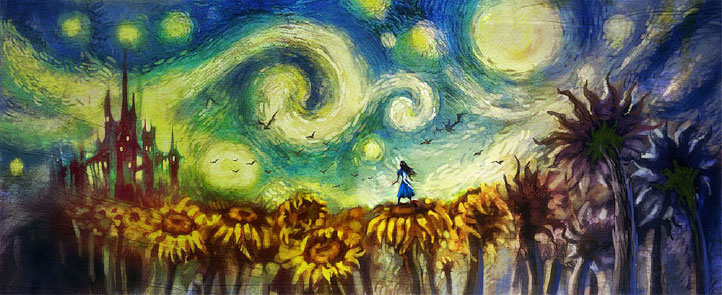
After surviving such a traumatizing childhood experience, how did you cope with the darkness you would naturally feel, and how did you transform it from fear to motivation? Is there a certain moment you can recall that it changed for you?
The thing is, that event does not define me as much as things that came later in life. At the age of 25, I met a man who would become my creative and business partner. He and his wife invited me into their home, and into their lives. It's never too late to find a father, even a surrogate, and I was very lucky with who I found. Our working and personal relationship did more to shape me in positive ways than almost everything that came before.
These days, I still struggle with motivation, as I assume most people do, but I always find a way to refresh it through the people and interests with which I surround myself.
Interesting. From the articles I read, I came at this all wrong. They did not convey where your true motivation was. I now realize it wasn't the darkness that you overcame that motivated you. It's in the people and moments of kindness that you find your ambition. So, let’s talk about your early years in the industry. Your first major role in the industry was testing and designing levels for some of the greatest games of my childhood including Wolfenstein 3D, DOOM, Hexen, and Quake. What was it like working with the team from ID back in the heyday of the 90's?
When I first arrived at ID, I felt like a kid let loose inside Disneyland while the park was closed. There was a sort of magic in the air - amazing things were being built, cool technologies were emerging, and the culture was really fun. We all worked insanely long hours, were crazy about Deathmatch, really enjoyed each other's creativity, and were generally having a blast.
I understand that after ID you went on to work for EA. At this point in your career, had you already started to dream up Alice, or did your experience at EA lead to the creation of such a dark heroine?
The idea for Alice was inspired in part by my move to San Francisco (EA's HQ is in Redwood Shores, roughly 20 miles south of the city). After so many years in Texas, I was really inspired by the culture, natural environments, and people of northern California.
During your time at EA, you were placed in an role that nobody in their right mind would want. They put you in the role of being a "Hatchet Man". Can you tell us about what lead up to this role change and what this role entailed?
I don't think the idea was that I should be a hatchet man. And I think this idea of my role has been blown out of proportion to some degree (perhaps my own fault?). The original idea was that I visit developers who were struggling with budget/schedule and see what sort of assistance they needed. Several times I reported back that a given project was doomed, with sadly predictable results.
I imagine this took both a professional and emotional toll on you. How did you go from "Hatchet Man" to headliner on the box for Alice? Where did the concept come from, and to whom did you pitch it?
That side of the business is as unpleasant as you might imagine. I was happy to transfer away from that to something more creative.
The chance to create Alice came when EA exec, Rich Hilleman, who had taken a personal interest in my career and projects, asked if I'd like to submit a couple of game ideas for consideration. Based on that offer, I then spent some weeks building a pitch that included story and art. I was blessed to work with the aforementioned creative partner, RJ Berg, and a group of truly talented illustrators and concept artists. Together, we created a package that was impressive enough to get a green light for development.
It's pretty fascinating that one minute you're at your wit’s end, and the next you've got one of the largest publishers in the world sticking your name on a box headlining a new IP (intellectual property) and brand. I can only imagine how exciting that transition must have been. Was this something that you always sought, or did it just happen and you were pleasantly surprised?
It certainly wasn't something I sought. Being a high school dropout, I imagined a bleak future for myself, not one in which I was given freedom to build a game of my own design and then see my name on the packaging. As with many things from that era, the reality was bittersweet. My name being on the box caused bad feelings among some of the development team, and this has "haunted" me in unusual ways ever since. It's also helped to open doors and provided a foundation upon which I've built my independent development studio.
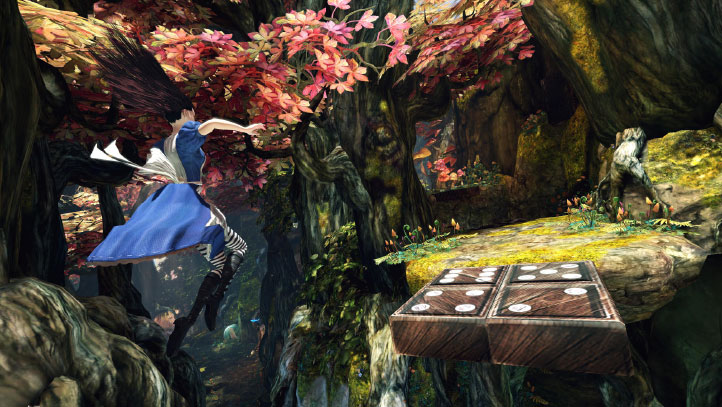
So, fast forward to the release of American McGee's Alice. You've got a game, a toy line that is still popular and selling like hotcakes today, clothing, and a huge cult following. Your little gem from the mind of American created a whole new alternate ending to one of the most acclaimed fairytales of all time. What can you tell us about the release of this title from your perspective?
While I was happy that the title was finished, released, and met with praise, I was less happy with things going on behind the scenes. The developer behind Alice, Rogue Entertainment, went out of business as a result of broken promises from EA. My creative partner on Alice, RJ Berg, was laid off after 15+ years of working at EA. I was left alone, holding this "success," while all the people responsible for helping to build it were scattered to the winds. It was a bittersweet moment, and all of this ultimately led to my deciding to leave EA and go out on my own.
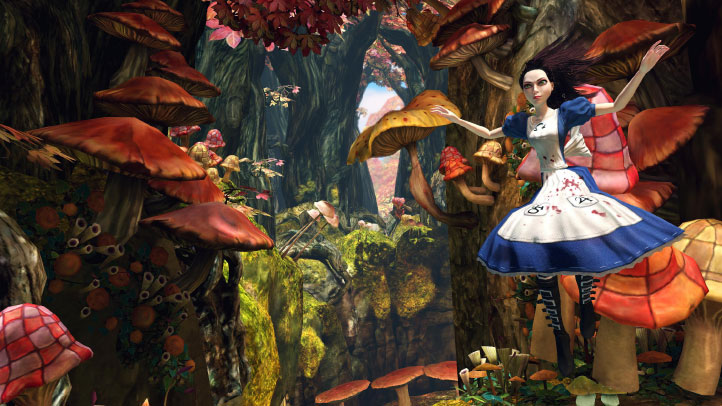
Since you’re sharing such personal detail with us, I felt it was only fair to do the same and give some light that you might not know about how your little dark fairy tale changed my life as well. At the time that this game launched, I was at my worst.
I too had a rough upbringing, but mine wasn't from my parents. The neighborhood I grew up in was very violent and cruel, and being the smallest, lightest kid around made me an easy target. Darkness and resentment filled me, and I was in a very bad place mentally. I picked up Alice mainly because I liked the box art, but also because it looked like a game I could go kill stuff endlessly and even have some interesting characters to interact with.
What I found, however, was a journey of person versus self. Just as Alice had to find her way out of her own darkness, the same was true for me. The trauma that we often feel as youth sticks with us through life, and if we can't find a way out we, like Alice, are trapped in our own minds. This game hit very close to home for me and instantly became my favorite game of all time. Perspective is a funny thing. One minute the world looks dark and hopeless, yet the next the tiniest light shines bright and gives you hope.
Thank you for sharing that :)
Your transition from that darkness to what you've become today is inspiring. Do you still draw inspiration from the darkness you felt, or has it become a dull silence of the past and you look to new inspiration for your current ideas?
Working with the things that helped inspire themes and narratives in the Alice projects was emotionally challenging. After building two games upon those foundations, I feel ready for new inspirations. At the same time, I am less involved with day-to-day creative and development activities and more focused on running the business. I think people working for me are thankful I'm not taking any inspiration from my past to drive thinking on company culture or accounting!
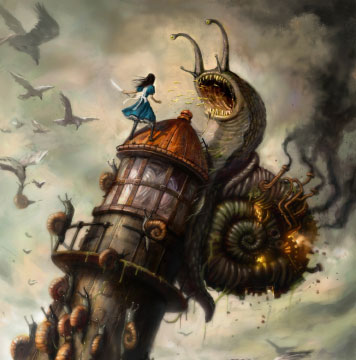
So let’s fast forward a bit. It wasn't long after the release of Alice that you decided to undergo a very life-changing decision. What lead to your decision to leave America and move to China?
There were many small influences that contributed to the idea and the final decision. After leaving EA, I moved from San Francisco to Los Angeles and spent some time working on film and TV projects. At the same time, I was traveling over to Hong Kong quite frequently, at first to visit a friend, and later to participate in lectures and events at Hong Kong Polytechnic University. I was looking for an "out" from the US and had been for a while. Asia had fascinated me since my first visit, and life in the US was losing its appeal. The non-stop wars, partisan politics, declining infrastructure and questionable quality of life…. All of these contributed to my disillusion with life in the States. Hong Kong (and then China) just happened to present themselves as an opportunity in the midst of my growing disillusion.
What was the hardest part about leaving the United States and starting a new life abroad?
There were two big things: friends and possessions. I think most people understand the pain suffered when you have to move away from well-established friendships. What surprised me about myself was just how much of my personal identity was wrapped up in my "stuff," and how much pain was created in leaving that stuff behind. Letting go of a home full of gadgets, a car, and reducing life down to 2 suitcases, a laptop, and a cat left me feeling disconnected from my "identity of items."
Moving away from the US, and especially to a country where you don't speak the local language, drives home the fact that we're constantly surrounded by marketing aimed at defining ourselves. In the US, I'd see "tanning creams" and in Hong Kong, I'd see "whitening creams." Marketing is the art of telling you that everything you are is wrong. So, after suffering a bit of a personality meltdown as a result of the move, I was thankful for having my eyes opened and my future freed from the bombardment of illusions.
Beyond that, I think the challenges were what you'd expect, making new friends, learning a new language, embracing local customs, and so on. Then again, I've grown to love these challenges, and particularly the ones specific to China. It's an amazingly diverse place. Travel an hour and you'll find a new spoken language dialect, local cuisine, and regional customs.
Anything you miss from your old life?
It's been over 10 years since I left the US, so the "old life" is simply too far away. I've changed too much to think I'd still find aspects of that life as appealing today as I did back then. I do miss the sushi in Los Angeles, though!
So here you are in a new country, and you start your own company called The Mauretania Import Export Company (TMIEC). What projects did you produce in the four years that you ran this company?
Actually, TMIEC was started while I was living in Los Angeles. Upon arriving in Hong Kong, I went to work for a company called Enlight. There, I produced what's arguably one of the worst video games ever made: Bad Day LA. It's terribleness is mainly my fault, as I was the lead writer and designer. That project consumed about one year of time, after which I moved to a sparsely populated island near Hong Kong and spent a year writing. At that same time, I was traveling to mainland China to help a friend start an art-outsourcing business in Shanghai.
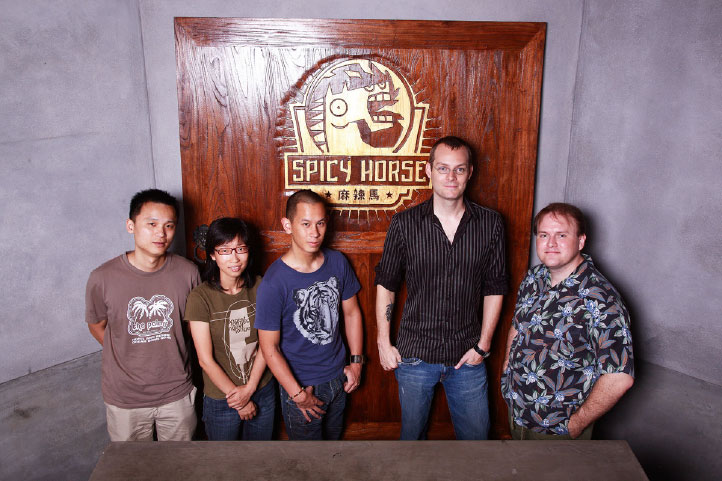
After TMIEC, you launched Spicy Horse with a very new idea and innovative idea about the gaming business. Can you discuss some of the concepts you had going into this new company, and the things you sought to change from the traditional gaming company?
During my travels to Shanghai, I noticed that options for local developers were pretty limited. They could either work for a large-scale Chinese operator making games for the local, Chinese market, or they could work for an outsourcing company making content for Western games. In either case, creative input was pretty limited, and work conditions were less than great.
My "big idea" was simply to open a studio with a high quality of life for employees and a development focus on unique, original IP for global audiences. My theory was that I'd be able to attract talented local (Chinese) developers along with Western developers looking for some adventure in China. Turns out the theory was correct. As soon as the studio was started, I'd managed to pull in some really impressive developers. Eight years later, we're still going strong.
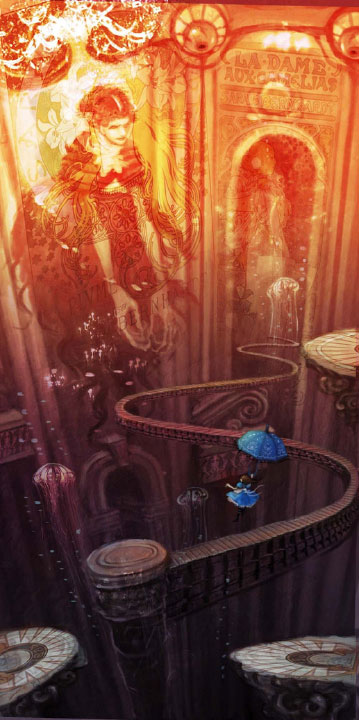
Were there any differences you saw with the Eastern way of business and the Western way of business?
I used to think there were differences, but more and more, I think it's the same wherever you go in the world. Money talks, success opens doors. The rest is just nuance.
Were your new employees’ attitudes and work ethics different from what you were used to?
From the start, we employed people from all over the world: Chinese, Americans, Belgians, Australians, etc. We actually have a hallway full of flags from all the countries of origins of our employees over the years. As with any business, I think the concept of differences is mostly a myth. When it comes to quality developers, they share a similar passion and work ethic, they use the same tools, and they develop games with the same goals in mind.
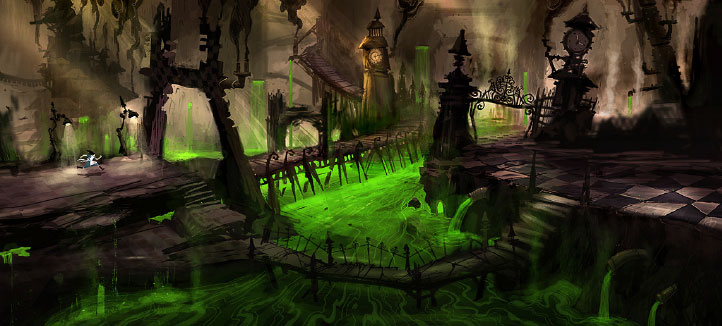 Was this a pleasant change?
Was this a pleasant change?
We've been fortunate in maintaining a very healthy work culture over the past eight years. There have been difficult times and difficult people, but the core group has survived, along with a shared understanding about work ethic, quality of life, and goals.
So that brings us to Alice: Madness Returns. How did you get the rights to make the game after leaving EA to form your own company? I imagine this was not an easy feat.
It took over a year to complete the contract negotiation before we could begin development. It all started as a simple email from me to a friend at EA: "I have a well-established development pipeline and a desire to make the next Alice game…."
The long-awaited and much-loved sequel also brought the original American McGee's Alice to the console world, which gave it a second life. How was the reception of this game compared to that of the original? I imagine it brought not only the cult following you had from the classic but also introduced new people to the game series.
The very first published review gave it a "50," which is pretty terrible. Similar reviews from mainstream sites popped up, all of them complaining about things like pacing and repetitiveness. We understood when we shipped the game that these would be issues, and we lobbied EA to give us more time to tune and polish the game. Unfortunately, we were out of time and money, so the game went out in a poor state. For the hardcore fans, the pacing wasn't a problem, and many people absolutely love the game. So, the cult following stayed loyal, and the press mostly hated it. Compared to the original, there’s not much difference in the reaction! I'd guess that's why the Alice games are called "cult hits."
I understand that you had a Kickstarter going to bring the conclusion to the Alice trilogy to the big screen in the form of Alice: Otherlands. Part of this included pushing to buy the rights for the Alice brand and securing the voice actors from the original. What can you tell us about this new project, and how did the Kickstarter go?
The Kickstarter for Alice: Otherlands went great. We hit our goal and raised a bit beyond that. The option for the film rights was secured, and work on the animations began immediately. We're shooting to have animation production finished before end of year (2014), at which point we'll produce DVDs and art books and then ship those items out to backers.
Let's talk about the basis of the film. I understand the third part explores some of the greatest minds of Victorian times, including Jules Verne, Charles Darwin, Ulysses Grant, Mark Twain, and possibly even Jack the Ripper. Stepping into Alice's head was a blast. I can only imagine stepping into other minds from this time period. I'm sure that we're in for a real treat. Is there anything you can share with us about the story behind this film, and what we can look forward to?
There are two animated shorts in production. One visits the mind of Jules Verne, and the other travels into the psyche of Richard Wagner. Based on what I've seen so far, they are both on track to turn out great. More details, animation samples, and production stills can be found on the Kickstarter page for Otherlands.
kickstarter.com/projects/spicyhorse/alice-otherlands
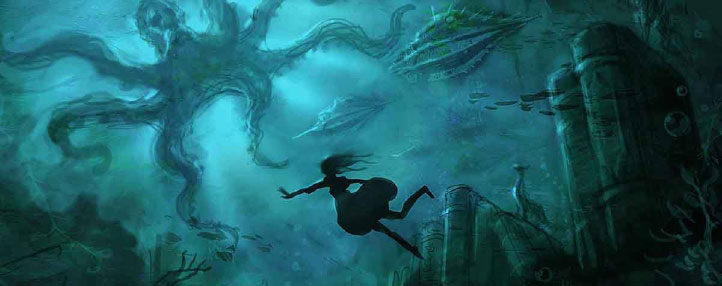
So, looking back over the years, you've made the torment of your youth a minor footnote in your life and found inspiration in the people you surround yourselves with. You have risen above all obstacles to create one of the most loved characters in gaming history. Is there anything about this journey that you hold close to heart? A certain turning point where your perspective just changed?
Life has been full of turning points, each of them responsible for some critical movement forward in life. Each new turn is linked to and dependent on the previous turns, such that none feels greater or more important than the rest. I think this is the way of life - a constant moving forward and evolving over time. When that stops, we're done. I'm just looking forward to the next major turn, the next shift in perspective.
What would you tell someone who is in that dark moment right now, when all seems hopeless, and things just seem to be going the wrong direction?
Sometimes, you have to fight through it and keep moving. Other times, it's best just to lay down and take a break. Everyone is dealing with their own personal narrative, acting as their own hero in a grand adventure. If I had the magic directions to solve another person's problems, I think that would take away their meaning. You could say life is hopeless, that it does tend to go in the wrong direction more often than not, but then, that's what gives us our purpose: making the best out of whatever we're handed.
Thank you so much for discussing your colorful life and career with us today. You have been an inspiration for me in my life, and I'm certain others feel the same.
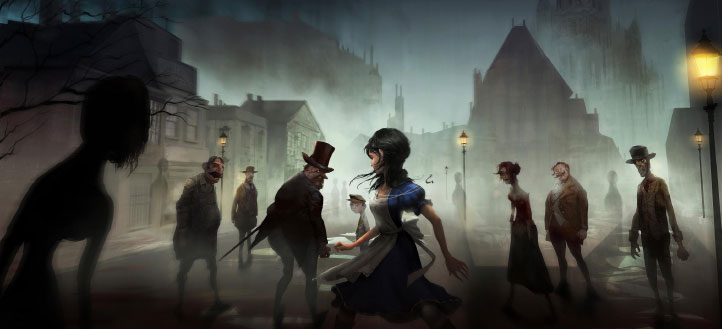
About the Author
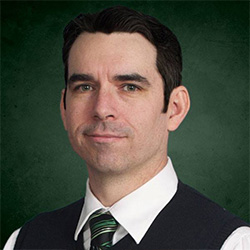
Foghladha
Managing Editor
Foghladha founded the Gaiscioch Social Gaming Community in 2001 and has since been the founder & activities director for this well known community. His role has gone beyond just running the Gaming Community and now includes running the Athletics Program in Portland, Oregon, as well as acting as the Managing Editor of the Gaiscioch Magazine, and is the Lead Producer on the Gaiscioch Livestream Productions. Additionally he networks with game developers to form relationships between Gaiscioch and development studios.
His experience in publishing dates back to helping his Grandparents who operated a printing press for over 40 years. In high school and college Benjamin excelled in journalism and played an active part in the school newspaper. Foghladha currently works full time as the director of technology for a franchise trade publication & education company.
